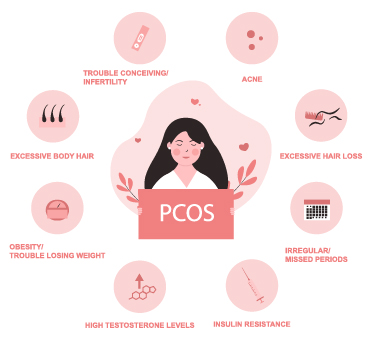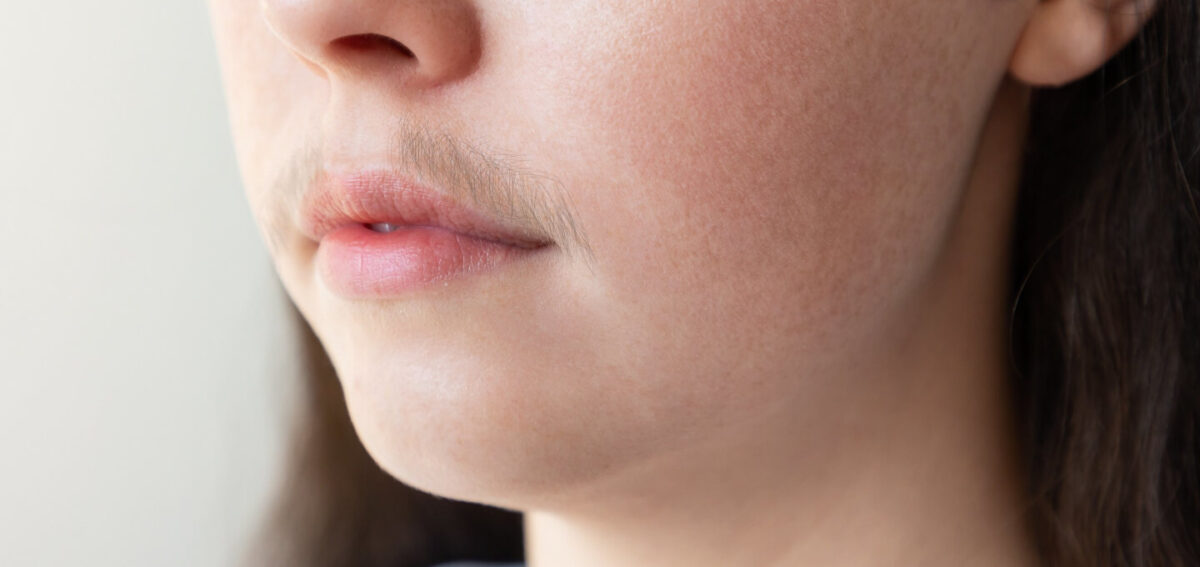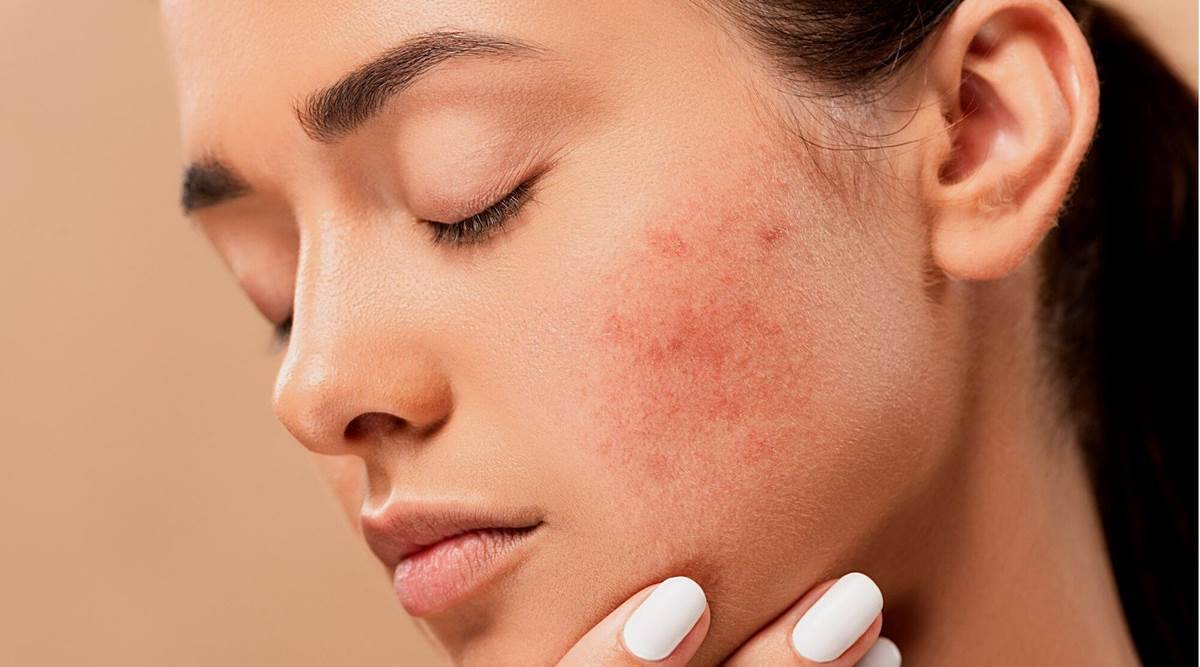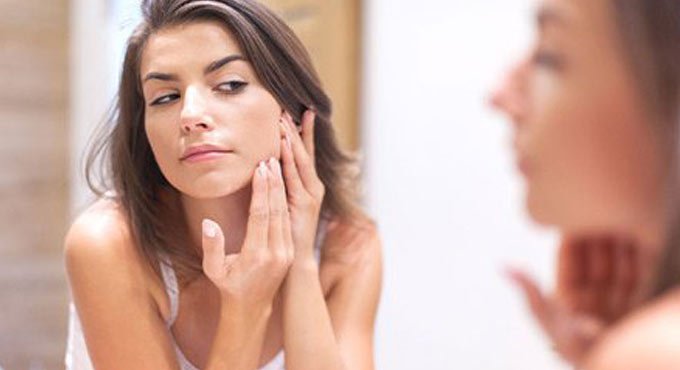Your skin can be a window to what is going on in your body. How To Manage Good Skin with PCOS is an important question? PCOS is an endocrine disorder or hormone deficiency that affects nearly 1 in 10 women of childbearing age. The cause is not known, but family history, poor lifestyle such as poor diet, poor immune system, and environmental toxins can increase the risk of the disease. There is no permanent cure, but it can be controlled with some life-long changes.
As women with PCOS often have problems such as weight gain, irregular periods, pregnancy and insulin resistance, women with PCOS will also have skin problems. Due to hormonal changes, PCOS patients may experience cystic acne, excess facial and body hair, dark spots, skin discoloration, hair loss, or baldness.
What is PCOS?

Polycystic ovary syndrome (PCOS) is a common problem in women that begins at a young age. This is the lack of hormones (messengers) in the brain and ovaries.
Symptoms and Signs
- Acne
- Overweight or trouble losing weight
- Cysts on the ovaries
- Irregular periods
- Unwanted hair growth on face, belly, back, or chest
- Dark patches of skin around neck or underarms

Causes
When a girl has PCOS, there is a deficiency of hormones that regulate the body’s hormones. During pregnancy, the ovaries produce estrogen (hormone), which causes the egg to come out every month (ovulation). If not fertilized (conceived), there is menstruation. This cycle repeats itself every month.
In PCOS, the hormones that control menstruation are disrupted. The weather can change or stop completely. Sometimes, if the eggs are not released, small fluid-filled sacs (cysts) can develop in the ovaries. Some people believe that insulin deficiency can cause hormone deficiency because excess insulin is associated with weight gain. Although most women with PCOS are overweight or obese, some are overweight or thin. Women who are not overweight may still experience one or more of the following symptoms: acne, periods, and unwanted hair.
Insulin is a hormone produced by the pancreas. High insulin levels cause the ovaries to produce more testosterone and less estrogen. Although all women produce testosterone, women with PCOS produce too much. Acne and unwanted hair growth can be caused by excess testosterone.
Dark spots on the skin can be caused by high insulin levels associated with obesity. They usually develop on the back of the neck (or neck) and sometimes under the neck. This rash is called acanthosis (also known as THO sis). Some girls may have high blood pressure and cholesterol problems. There is no known cure, but the condition can be treated with diet, exercise and medication.
Diagnosis
There is no specific test to diagnose PCOS. A doctor diagnoses PCOS by ruling out other diseases and knowing the symptoms of PCOS. The doctor will ask questions about your periods, exercise and diet, and perform the examination. Blood test for hormones. An ultrasound may show ovarian cysts or other abnormalities.
Treatment
The purpose of the treatment is to balance hormones and periods, reduce negative symptoms (acne, hair growth) and reduce the risk of other problems.
Medicines
- Metformin – This is also a drug that should be taken orally. Helps maintain normal blood sugar levels.
- Topical Creams (skin) creams and ointments – These are applied to the skin. They reduce the effects of acne.
- Birth control pills – oral medicine. The hormones in the pill help regulate periods. The pill can also help reduce testosterone levels and reduce acne breakouts (see Appendix HH-IV-3, Fertility Control Drugs).
Diet and Exercise

Eating a small, healthy, balanced diet and getting at least 30 minutes of exercise a day can help you lose weight and lower your insulin and testosterone levels. Sometimes health and exercise is all the therapy you need to manage your hormones.
Shaving, waxing, hair removal creams and laser hair removal
All these things help to remove unwanted hair from the skin.
There are other medications that are used to treat acne and unwanted hair. Your doctor or nurse will evaluate the side effects of medications prescribed to treat PCOS. Be sure to ask your doctor before choosing them.
If PCOS is not treated, you are at a higher risk of:
- Obstructive Sleep Apnea
- High blood pressure and high cholesterol
- Depression
- Type 2 diabetes
- Abnormal bleeding from the uterus
- Difficulty having children
How To Manage Good Skin with PCOS?
Some of the skin problems caused by PCOS and their treatment are discussed below.
1. Acne
PCOS acne is caused by different levels of hormones such as estrogen, progesterone and testosterone. Depending on the severity of your acne, your doctor may prescribe oral contraceptives or hormone replacement therapy. For mild cases, diet changes and a proper skin care regimen work.
Antibiotics can also help with this. Limit or eliminate all good carbs, dairy, protein, high GI (glycemic index), sugar, alcohol, saturated fat and fiber, avoid eating lots of good protein. Dietary supplements such as vitamin D, magnesium, vitamin B6 and zinc also help.
Simple skin care routines like washing your face at least twice a day, using only moisturizer and not showing makeup can help.
Melasma

It is also known as chloasma, is a skin condition that causes spots and areas that are darker than your skin tone. Melasma and PCOS are related because both cause hormonal imbalances, changes in female hormones and excess androgens.
Unfortunately, no treatment will make melasma go away, but most dark spots will disappear over time due to hormone levels. Avoiding sunlight, reducing stress, getting at least 7 hours of sleep, and eating antioxidants can also help. Some home remedies include using aloevera gel, turmeric, licorice extract, black tea and orchid extract.
Living with PCOS can be difficult for women. From major problems like type 2 diabetes and high risk of infertility to minor problems like acne, managing PCOS can be taxing and emotional. The only way to prevent PCOS is through permanent lifestyle changes and proper treatment.
Hirsutism

Hirsutism is the growth of excessive facial hair. The reason for this is the increase in the level of androgen, which is a male hormone. Women with hirsutism will not only have to endure physical pain while fighting unwanted hair, but they will also go through emotional and psychological abuse and depression.
There are many types of hair removal, from short-term methods such as shaving, waxing, epilation to long-term methods such as lasers and electrolysis. But if androgen levels are not corrected, hair growth will return.
Sometimes, being overweight can help reduce androgens. But many patients need antiandrogen therapy as a treatment. Applying eflornithine cream (Vaniqa) and lavender or tea tree oil to the affected area also works to some extent. Solutions to reduce androgens include adding foods rich in antioxidants, avoiding processed foods and grains.
Acanthosis Nigricans or Darkening Skin
Insulin resistance causes darkening and thickening of the skin, where insulin is produced but cannot be used effectively. Common areas are the arms, neck, inner thighs, around the lips, under the eyes and forehead. You should choose the best online experts as soon as possible. Delaying treatment can lead to life-threatening diseases such as cancer.
To control your insulin, your doctor may prescribe metformin and a low-carbohydrate diet. In addition, regular exercise also helps to reduce insulin levels.
It is important to clean dark skin properly. You can use vitamin C, azelaic acid, kojic acid, benzoyl peroxide or niacinamide for them. Do not bleach, use toothpaste or OTC peeling treatments on the affected area.
How PCOS affects the skin?

PCOS affects the skin in many ways. A lot of unwanted facial hair is seen on the cheeks, chin and chin. It also causes hair loss. Enlargement of the chest and abdomen, thinning and darkening of the skin. body neck and arms. called acanthosis nigricans. Itching and severe itching are also common.
PCOS and dry skin is a common problem during winter, because the harsh weather can make the skin dry and itchy.
Now that winter is here, here are some things you can do to prevent the irritation and itching caused by PCOS:
Use a hydrating moisturizer
Since dry skin is a symptom of PCOS, the best way is to use warm water regularly. “Wash your face at least twice a day with a good cleanser that contains moisturizing and nourishing ingredients. Follow this with water to reduce dryness caused by PCOS. It is also important to use the cream after showering to help lock in moisture and make your skin soft, smooth and non-irritating. If you have sensitive skin, avoid scented moisturizers with essential oils, which make the skin worse.
- Use a hydrating moisturiser
- Reduce the temperature of the shower
- Beware of acne
- Manage PCOS control
- Consult to your dermatologist
Effective tips to manage PCOS effectively:
- Losing weight helps reduce the amount of androgens, or male hormones, in the body, which significantly reduces symptoms.
- Don’t eat foods high in carbohydrates, sugar, fat and processed foods.
- Do a physical Exercise regularly.
- Make sure you eat a healthy diet that includes green vegetables and fruits.

